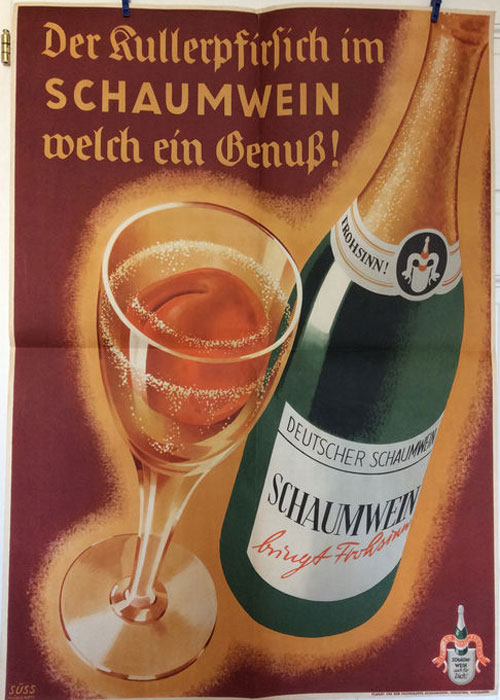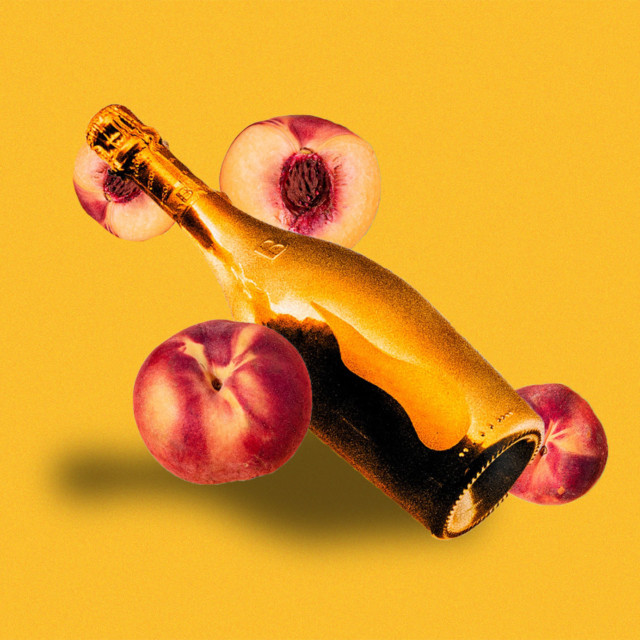Halfway through “While the City Sleeps,” a 1956 film noir directed by Fritz Lang, actor George Sanders is sitting in a booth with Ida Lupino in a stylish, vaguely tropical New York restaurant. Before him on the table are two deep, glass goblets, each with a small peach nestled inside. While Lupino talks, Sanders methodically pierces each peach on all sides with a fork. His nonchalance indicates he’s done it countless times before. He then fills each glass with Champagne. The peaches float to the surface.
Neither character comments on the elaborate procedure, as if plopping punctured peaches in your bubbly were the most commonplace of activities. And no mention of the drink is made. But if Sanders had cared to identify it, he could have used any number of names, including: Peach in Champagne; Peach Over Champagne; Peach Champagne; Champeach Cocktail; Whirling Champeach Cocktail; or Kullerpfirsich, as it was and is called in Germany. Each handle was used at one time or another during the mid-20th century to describe this forgotten, glamorous party drink.

“It was a 1950s-’60s home bar show drink,” says Jörg Meyer, the owner of the renowned Hamburg cocktail bar Le Lion, and the only veteran bartender I reached out to who remembered the cocktail at all. “If you ask me, it was pure after-war fun, nothing about quality drinking.”
It makes sense that Meyer would recollect Peach in Champagne, as the drink seems to have originated in Germany — specifically in Cologne, at Die Bastei, a restaurant that opened in that city in 1924. Built on top of a medieval fortification at a bend in the Rhine, the circular structure both commanded impressive views and created one. (One has to wonder if Peach in Champagne won its cameo in “While the City Sleeps” because its director, Lang, was Austrian and worked extensively in Germany prior to World War II. Lang may have drunk his share of Kullerpfirsichs as a young man.)
Kullerpfirsich means “whirling peach,” and that is exactly what happens when you make the thing. The drink requires a good amount of labor, but your work pays off in the form of an amusing show. A 1960 article in the Cincinnati Enquirer described the process this way:
When the drink was ordered, a rosy unpeeled peach was well pricked with the tines of a fork, placed in the bottom of a tall beautiful glass with one teaspoon sugar. Over all was poured very cold Champagne. The pricked peach rose to the occasion, spinning rapidly in the top of the glass until the absorbed liquid pulled it to the bottom. … Patrons were given a salad plate, fruit knife and fork and made a leisurely rite of peeling and eating the fruit after drinking the Champagne.
The drink started making international headlines after World War II. In 1948, it was featured on the cover of nothing less than Gourmet magazine — something brought to my attention by Louis Anderman, the founder of Miracle Mile Bitters in California. Gourmet called it “Peach in Champagne,” instructed readers to use a “sound, ripe white peach,” and suggested adding a touch of Cognac or peach brandy. The Gourmet article suggests the drink may be a relative of the Bellini, which calls for Prosecco and peach puree. But, given the use of sugar in the recipe and the showmanship aspect of the drink, it seems more likely that Peach in Champagne began as a riff on the Champagne Cocktail, which plays its bubbly tricks on a sugar cube at the bottom of the glass rather than a peach.
Peach in Champagne was enough of a sensation by the 1960s that glassware companies started to put out special vessels designed specifically to accommodate the drink. And at least six of those glasses may have made their way to the White House. The Pittsburgh Press reported in 1966 that Lyndon B. Johnson, when he was vice president under Kennedy, “turned to Seneca Glass Co. for a half dozen specially blown ‘peach champagne’ glasses embossed with his initials and a 10-gallon Texas hat.” The article pointed out that each glass held “a peach or two and a little Champagne.”
Media mentions in the United States of Peach in Champagne and its accompanying glassware trickled off in the 1970s. By the next decade, the drink was forgotten. (It is still known, and apparently drunk, in Germany. If you search #Kullerpfirsich on Instagram, nearly all of the photos are posted by German accounts.)
Constructing the cocktail today is tricky, since peaches, like many other fruits, have generally grown in size since the postwar years, making it hard to find a glass that accommodates a whole fruit. But a recent experiment by this writer showed that the trick still works. The world may change, and drinking tastes may change along with it, but the ol’ peach keeps spinning round.
